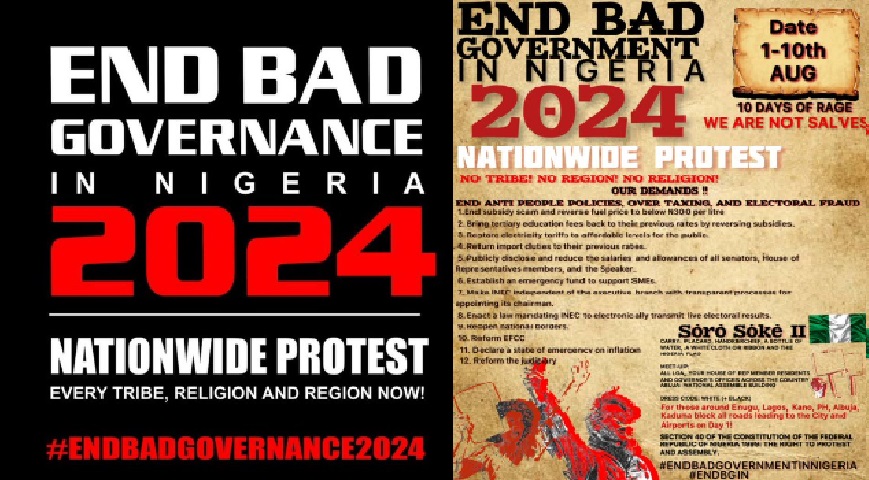A poster circulating on social media announces that Nigerians plan to hold anti-government protests in August, demanding improved governance from the current administration. The nationwide demonstrations are scheduled to take place from August 1 to 10, 2024. The poster outlines 12 key demands, including addressing alleged anti-people policies, excessive taxation, and the need for electoral reforms.
Section 40 of the Nigerian Constitution grants citizens the right to protest and assemble.
Using the hashtag #ENDBGIN, organizers have united people from all tribes, regions, and religions to support the cause.
“Carry placard, handkerchief, a bottle of water, a white cloth or ribbon and the Nigerian flag. Dress code white and black,” the poster says.
It states that demonstrators will gather at all local government buildings, the residences of House representatives, governors’ offices, and the National Assembly in the capital, Abuja.
Did you read this?
Enough is Enough
— Gbadebo Rhodes-Vivour Stan (@CrownprinceCom2) July 5, 2024
Tinubu is not capable
Tinubu is sick
Tinubu must GO
Tinubu must GO
Tinubu must GO
Tinubu must GO #TinubuMustGo #protest #EndAPC pic.twitter.com/ZuWpYjpHwq
“For those around Enugu, Lagos, Kano, PH, Abuja, Kaduna block all roads leading to the city and airport on Day 1.”
The recent anti-Finance Bill protests in Kenya, which have taken place over the past two weeks, have significantly influenced the planned demonstrations. These protests, driven primarily by Kenya's Gen Z youth, aimed to pressure the government to withdraw proposed new taxes in the Bill, which were widely viewed as punitive. According to government reports, 25 people lost their lives when the protests turned violent.
Property worth millions of shillings was also destroyed after goons reportedly infiltrated the peaceful protests.
President William Ruto eventually declined to sign the Bill into law and, on June 26, sent it back to Parliament, asking MPs to delete all contentious clauses.
On Friday, the President engaged with Gen Z on the social media platform X, where the youth directly outlined their primary concerns to him.
Whilst admitting that the Finance Bill, 2024 was rejected largely due to "falsehood and propaganda", the President said he had heard what the young people want changed and would work on the suggestions.
"My administration has always believed in listening and engaging and that is why I go around the country to engage people. I rarely sit in the office. I go to different places to engage with Kenyans," he said.
"I have gone home with 'I need to listen more, I need more empathy'. My administration needs more empathy and I have heard you say more action," he said.
In Nigeria, protest organizers want to pressure the government to end subsidy, which they have termed “scam”.
They also demand that fuel prices be reduced to below 300 Naira per liter, the reintroduction of education subsidies to lower tertiary education fees, and the restoration of electricity tariffs to affordable rates.
According to the poster, Nigerians also want import duties returned to previous rates, a reduction in the salaries and allowances of all House representatives, including senators and the speaker, and the establishment of an emergency fund to support SMEs.
Additionally, they seek reforms in the Judiciary, the Economic and Financial Crimes Commission (EFCC), and the electoral agency INEC.
“Make INEC independent and the executive branch with transparent processes for appointing its chairman. Enact a law mandating INEC to electronically to transmit live electoral results,” the poster reads.
President Tinubu was declared the winner of Nigeria's February 25 presidential elections after defeating two other prominent candidates.
He took office amid a fractured nation, an ailing economy, and spiraling insecurity.
Protest organizers are calling on him to reduce the country's inflation.









